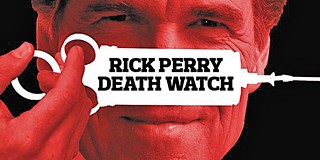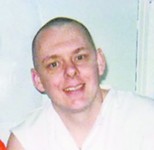Death Row Inmate Hoping for Supreme Intervention
Original defense attorney called no witnesses and presented no mitigating evidence
By Jordan Smith, Fri., Sept. 14, 2012
The Court of Criminal Appeals last week denied a stay of execution for Robert Wayne Harris, convicted in 2000 of killing two people during a shooting spree at the Mi-T-Fine Car Wash in Irving. Unless the federal courts intervene, on Sept. 20 he'll be the eighth man executed in Texas this year.
Harris, who had been fired from the car wash three days prior to the shooting, opened fire on his former colleagues shortly after the car wash opened, killing five of six employees. He was sentenced to death for the murders of cashier Rhoda Wheeler and assistant manager Augustin Villasenor.
Harris confessed to the crime, and at trial his defense attorney failed to offer any witnesses. An all-white jury convicted Harris (who is black) after just 15 minutes of deliberation. The defense also failed to hire an investigator to ferret out mitigating evidence that could have spared Harris' life, so when, during the punishment-stage deliberations, jurors asked the judge for such evidence, like school or psychological records, to consider in deciding whether to impose a life sentence instead of death, there was none. After a total of three days in court, the jury sentenced Harris to die.
In his first appeal to the CCA, Harris argued that the state violated his due process rights during jury selection by improperly striking qualified black jurors. That appeal was denied. On Aug. 27, Harris' attorney Lydia Brandt tried again, arguing to the CCA that the court should reconsider the issue based on the U.S. Supreme Court's 2005 decision in the case of Thomas Miller-El. There, prosecutors excluded 91% of eligible black jurors, a "disparity unlikely to have been produced by happenstance," the court wrote. The CCA should reopen Harris' case, Brandt wrote, because of the "exceptional miscarriage of justice" that occurred.
The CCA denied Harris' appeal for a stay on Sept. 5, saying there was no "new legal basis" created under Miller-El that would prompt them to reopen the case. Brandt disagrees; the CCA has previously said Miller-El created "a new legal landscape" in Texas, but now "when it comes to my client, they say it's not a new legal basis." Brandt will appeal the case to the Supremes, asking them to stay the case pending further review.
In another twist, Brandt says Texas Attorney General Greg Abbott's office has blocked attempts to set up a reconciliation meeting between Harris and a family member of one of his victims. According to an Aug. 1 letter to Brandt from Assistant Attorney General Georgette Oden, participation in the Texas Department of Criminal Justice's Victim Offender Mediation/Dialogue Program would require Harris to "admit guilt and accept responsibility" for his crimes. Harris cannot agree to that because of ongoing litigation, Brandt says, but she suggested that the family member might want to meet with her and have as many questions answered as possible. The state has not provided any information about the family member seeking the meeting and, to Brandt's knowledge, has not passed her contact information on to said family member. AG office spokesman Tom Kelley wrote in an email that Brandt never told them whether Harris would participate "under the prescribed requirements" for mediation, and also that the office has lost contact with the family member in question.
Because John Balentine, sentenced to die for a triple murder in Amarillo, was granted a stay to allow for a review of his claim that he received ineffective assistance of counsel, Harris would next week become the 485th person executed in Texas since reinstatement of the death penalty, and the 246th during the tenure of Gov. Rick Perry. (For more on Balentine's case, see "Ineffective Counsel Blamed in Death Row Inmate's Case," Aug. 17.)
Got something to say on the subject? Send a letter to the editor.











